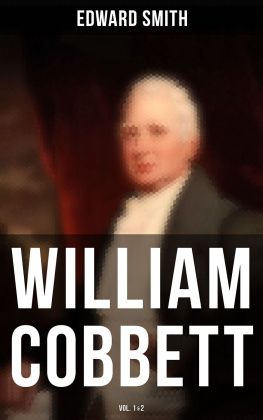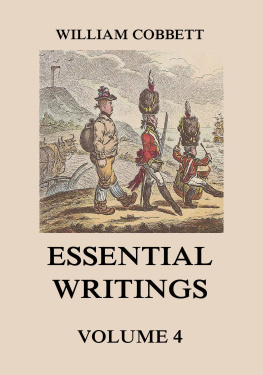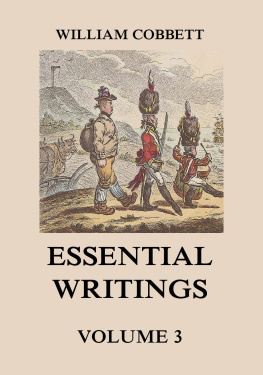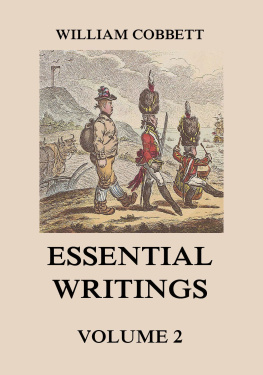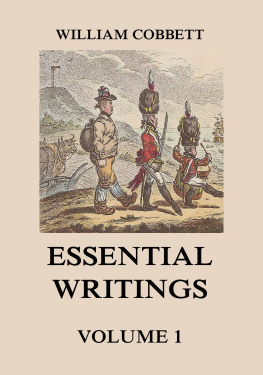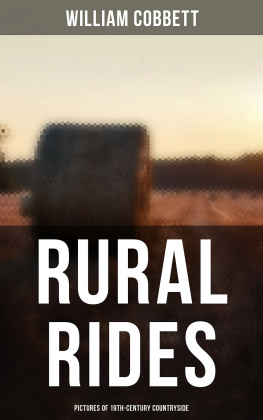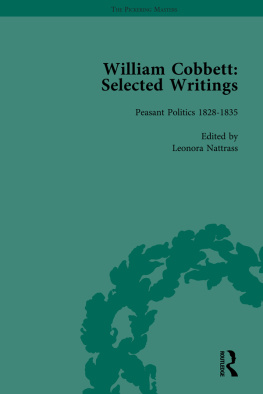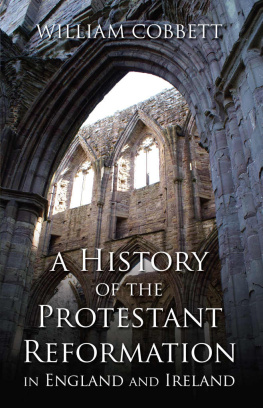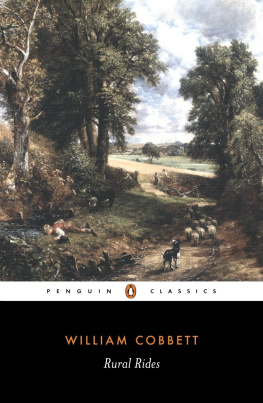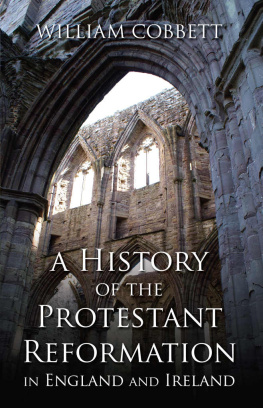CHAPTER I.
I LOOKED BACK WITH PRIDE TO MY WAGGON-DRIVING GRANDFATHER.
Table of Contents
William Cobbett was born in the parish of Farnham, in the county of Surrey, on the 9th of March, 1762.
The town of Farnham is a hop-garden. It had, in olden days, one of the most important corn-markets in the south of England. Before that, it was a great clothing mart; and, early in Parliamentary history, was called upon to send representatives to the Collective Wisdom. But, at last, the mercantile spirit proper, as was the case with many towns in Surrey, Kent, and Sussex, fled from Farnham; granaries took the place of workshops; and manufactures declined. With the extinction of the iron-furnaces of the Weald expired the once-flourishing trade of the south of England; and agriculture became the staple pursuit of the still-prosperous people, all over the fertile country which lies between the Thames and the English Channel. Corn-fields took the place of extensive sheep and cattle pastures; new grazing-downs succeeded to the burnt-up forests, whilst hops took the pick of the land, upon which they throve in a hitherto-unexampled manner. And Farnham, with its deep, rich, light-brown soil, found itself with a title to give to the best hops grown in England.
So Farnham is, to this day, a big hop-garden. In spite of a railway-station and 10,000 inhabitants, and the proximity of a garrison, the impression is, all around, the same. You enter the town from London, and the first church you come to is nearly surrounded with vines; the last building, at the other end of the long street, is an oast-house. You may take a lodging down by the river-side, and find a forest of hop-poles immediately outside your window, in the morning; or taking stand on any elevation, you will see all the uplands around, either in their luxuriant summer dress of vine, or else, so many square miles of poles placed tent-wise, taking their winter rest, looking like nothing so much as the encampment of a monstrous army.
They must have been clever enough in their generation, who planted and built hereabouts nearly two thousand years ago; but he who did the most on behalf of this part of Surrey was he who planted a small field of hops on the upland towards Crondell, somewhere about the year 1600. By the middle of the eighteenth century the hops of Farnham were already distinguishedalways at the top of the market; and the agricultural writers of that day wax eloquent over the praises of the pleasing, fertile vale, and its hazel-coloured, loamy soil, and the yearly-increasing number of acres given up to hop-culture. Arthur Young calls the district between Farnham and Alton the finest in England.
The scenery around Farnham is not, in itself, unique; so far, that any well-cultivated English river-valley is like almost any other, with its low hills crowned along their summits with the evidences of prosperous farming. But, from the top of one of these eminences, the eye soon discovers certain characteristics, which compel a deep impression upon the mind of singularity and beauty. The best view is, perhaps, to be obtained from Hungry Hill, near Aldershot; the most prominent object being Crooksbury Hill, rising from above the woods of Moor Park and Waverley Abbey. A very odd-looking hill, covered with tall Scotch firs, the like of which it would be difficult to name; a wide expanse of sandy heath, now partly cultivated, stretches for many miles beyond, until broken up into a tumultuous range of heath-clad hills; and these, again, succeeded by the distant blue outlines of the Sussex and Hampshire downs. The river Wey courses down the vale, passing through the lower part of Farnham town; and after spinning merrily through the meadows and hop-fields below, bends abruptly round in the direction of Guildford.
The inhabitants of this district, one hundred years ago, were almost out of the great World. The turnpike-road to Winchester and the south-west bounded their earthly aims; upon it was situated the weekly goal for the produce of their farms; and along it was, at a toilsome distance, either the great metropolis at one end, or Portsmouth and her marines at the other. With strong native prejudices, and a character for inflexible honesty, the farmers (generally speaking) lived remote, equal enemies to improvements in agriculture and to relaxations in morals; the smallest occupiers sharing the hardest toil with their labourers.
Before the great scarcity and dearness set in, in the last quarter of the centurywhen the clocks and the brass kettles began to disappear from the parlours, and the visions of general pauperism began to appearthe spirit of the peasantry in the remoter parts of Surrey was high and independentchill penury was then uncommon with the able-bodied. In the receipt of only seven or eight shillings a week of average money wages, such was the cheapness of food, and so light were the burdens which Prudence had to bear, that the labourer was healthy, cheerful, and contented; whilst he could often explain clearly enough, from his own observation and reflection, the merits or demerits of the different systems and practice upon the neighbouring farms.
Of this class was the grandfather of William Cobbett.
With respect to my ancestors, I shall go no further back than my grandfather, and for this plain reason, that I never heard talk of any prior to him. He was a day-labourer, and I have heard my father say, that he worked for one farmer from the day of his marriage to that of his death, upwards of forty years. He died before I was born, but I have often slept beneath the same roof that had sheltered him, and where his widow dwelt for several years after his death. It was a little thatched cottage with a garden before the door. It had but two windows; a damson-tree shaded one, and a clump of filberts the other. Here I and my brothers went every Christmas and Whitsuntide, to spend a week or two, and torment the poor old woman with our noise and dilapidations. She used to give us milk and bread for breakfast, an apple-pudding for our dinner, and a piece of bread and cheese for supper. Her fire was made of turf, cut from the neighbouring heath, and her evening light was a rush dipped in grease.
George Cobbett, son of this old couple, appears to have much improved his condition in life; and he lived to see all his boys gradually rising in the world. William was the third (out of four), and he gives vivid sketches of their daily course of existence.
My father, when I was born, was a farmer. The reader will easily believe, from the poverty of his parents, that he had received no very brilliant education: he was, however, learned, for a man in his rank of life. When a little boy, he drove the plough for twopence a day, and these his earnings were appropriated to the expenses of an evening school. What a village schoolmaster could be expected to teach, he had learnt, and had besides considerably improved himself in several branches of the mathematics. He understood land surveying well, and was often chosen to draw the plans of disputed territory: in short, he had the reputation of possessing experience and understanding, which never fails, in England, to give a man, in a country place, some little weight with his neighbours. He was honest, industrious, and frugal; it was not, therefore, wonderful, that he should be situated in a good farm, and happy in a wife of his own rank, like him, beloved and respected.


